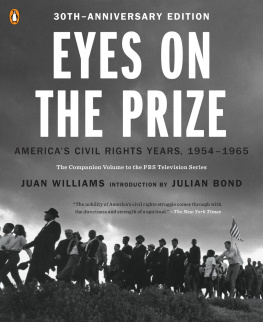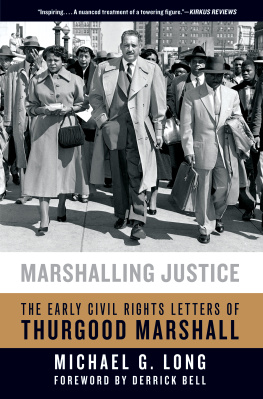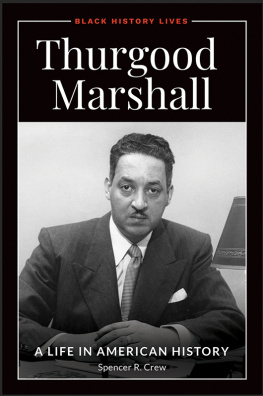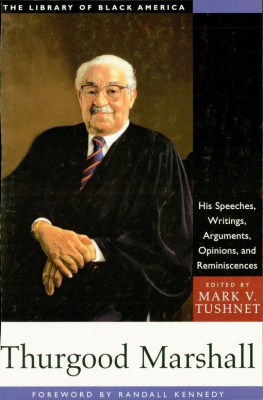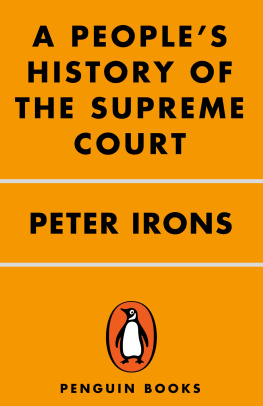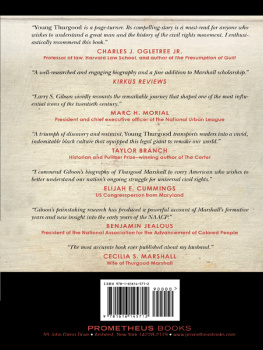Juan Williams - Thurgood Marshall: American revolutionary
Here you can read online Juan Williams - Thurgood Marshall: American revolutionary full text of the book (entire story) in english for free. Download pdf and epub, get meaning, cover and reviews about this ebook. year: 2000, publisher: Times Books, genre: Detective and thriller. Description of the work, (preface) as well as reviews are available. Best literature library LitArk.com created for fans of good reading and offers a wide selection of genres:
Romance novel
Science fiction
Adventure
Detective
Science
History
Home and family
Prose
Art
Politics
Computer
Non-fiction
Religion
Business
Children
Humor
Choose a favorite category and find really read worthwhile books. Enjoy immersion in the world of imagination, feel the emotions of the characters or learn something new for yourself, make an fascinating discovery.

- Book:Thurgood Marshall: American revolutionary
- Author:
- Publisher:Times Books
- Genre:
- Year:2000
- Rating:3 / 5
- Favourites:Add to favourites
- Your mark:
- 60
- 1
- 2
- 3
- 4
- 5
Thurgood Marshall: American revolutionary: summary, description and annotation
We offer to read an annotation, description, summary or preface (depends on what the author of the book "Thurgood Marshall: American revolutionary" wrote himself). If you haven't found the necessary information about the book — write in the comments, we will try to find it.
Thurgood Marshall: American revolutionary — read online for free the complete book (whole text) full work
Below is the text of the book, divided by pages. System saving the place of the last page read, allows you to conveniently read the book "Thurgood Marshall: American revolutionary" online for free, without having to search again every time where you left off. Put a bookmark, and you can go to the page where you finished reading at any time.
Font size:
Interval:
Bookmark:
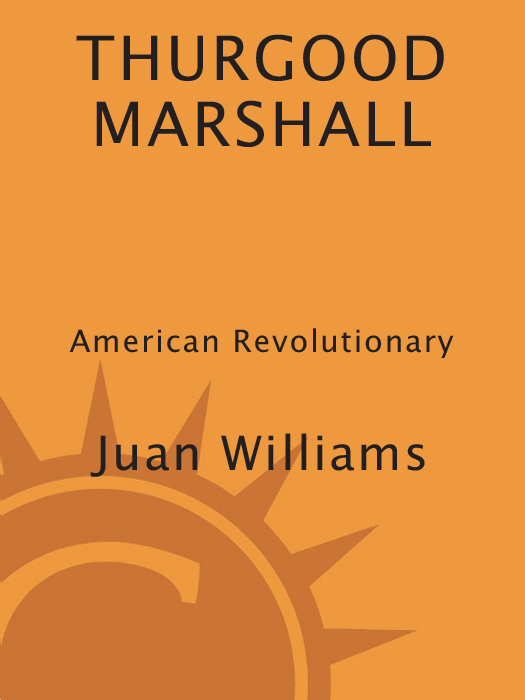
A LSO BY J UAN W ILLIAMS
Eyes on the Prize
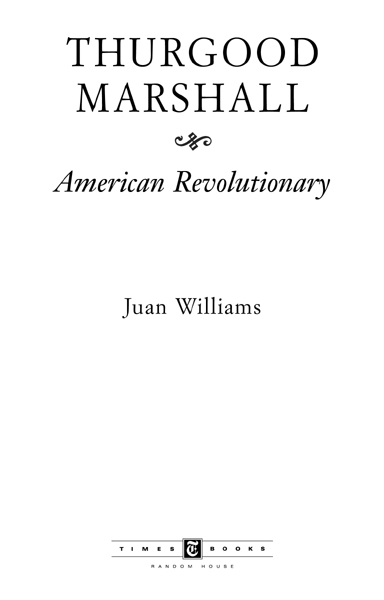
Copyright 1998 by Juan Williams
All rights reserved under International and Pan-American Copyright Conventions. Published in the United States by Times Books, a division of Random House, Inc., New York, and simultaneously in Canada by Random House of Canada Limited, Toronto.
Library of Congress Cataloging-in-Publication Data
Williams, Juan.
Thurgood Marshall: American Revolutionary/Juan Williams.
p. cm.
eISBN: 978-0-307-78612-8
1. Marshall, Thurgood, 19081993. 2. JudgesUnited StatesBiography. 3. United States. Supreme CourtBiography. 4. Civil rights workersUnited StatesBiography. I. Title.
KF8745.M34W55 1998
347.732634dc21
[B] 98-9735
Random House website address: www.randomhouse.com
v3.1
To Roger and Alma Williams;
the Episcopal Church; Brooklyn, New York, public schools;
Oakwood Friends School; Haverford College;
The Washington Post; and
Delise, Antonio, Rae, and Raphael.
For inquire, I pray of you, of bygone ages, and consider what the fathers have found. Will they not teach you, and tell you, and utter words out of their understanding?
Job 8:8-10
F IRST WORDS OF THANKS go to Christopher L. Teal, my research assistant. His energy, commitment, and passion for this biography were a constant source of encouragement. His talent and hard work made a valuable contribution to this book. His keen criticism, good sense, and friendship kept the writing on track. My hope is that he will go on to enjoy a career as a writer.
Special thanks to the Ford Foundation, the Marjorie Kovler Foundation, the Woodrow Wilson International Center for Scholars, the Brookings Institution, American University, Eastern Illinois University, and Georgetown University; to researcher Jane McWilliams, a guiding light through Maryland history; to Jonathan Karp, an insightful mind and terrific editor; to Peter Bernstein and Carie Freimuth, the strong, supportive publishing team at Times Books; to Sybil Pincus, production editor; to Mary Beth Roche, director of publicity, and Kate Larkin; and to Amy K. Sutton, marketing manager for Random House.
My personal thanks to Russell Adams; Mufutau Adeleke; Roger Ailes; Jodie Allen; Ben Amini; Esme Bahn; Robert Barnett; Sue Bennett; Cherea Bishop; Lucille Blair; John Blassingame; Charles Blitzer; Rick Blondo; David Bogen; H. B. Bouma; Peter Braestrup; Taylor Branch; Gloria Branker; Philip Brown; John Buckstead; Patricia Camp; Nixon Camper; Adrienne Cannon; Clay Carson; Reese Cleeghorn; Lovida Coleman; Chet Collier; Lindsey Collins; Cary Beth Cryor; Rick Davis; Charles Debnam; Marvin Delany; Herbert Denton; Lucille Denton; Joseph Duffy; Frank Ferraccio; Charles Firestone; Gail Galloway; David Garrow; Cheryl Gibert; Donald Graham; Ron Greile; Gina Wishnick Grossman; Joe Haas; Deborah Newman Ham; Louis Harlan; Kathleen A. Hauke; Michael Hicks; Doug Hock; Natalie Hohn; James Hudson; Britt Hume; Dennis J. Hutchinson; William Hyde; Donna and Marshall Jackson; Dante James; Pheobe Jacobson; Beat, Elena, Jonathan, and Alexandra Jenny; Jeanne Jordan; Tom Johnson; Raymond Jones; Michael Kelly; Damon Keith; Randall Kennedy; Ethel Kennedy; Linda Kloss; Whitman Knapp; Peter Kovler; Ken Kraven; Kim Lays; Theresa Layne; Michael Lacy; Rilda Lemons; Byron Lewis; Byron Lewis, Jr.; David L. Lewis; William and Cynthianna Lightfoot; James Loadholt; Norman Lockman; Dee Lyon; Ginger Macomber; Khalil Mahmud; Tom Mann; Ligia and Jonathan Mason; Wayland McClelland; Deborah McDowell; Jane McHale; Nancie McPhail; Ghebre Mehreteab; Courtland Milloy; Frances Murphy; Jocheol Nam; Barrett and Judy Nnoka; Prentice Nolan, Robert Novak; Susan Nugent; Gina Oglesby; Peter Osnos; Lesley Oelsner; Gayle Potter; Charlynn Spencer Pyne; Miriam Raymond; John David Reed; Olaf Reistrup; Chuck Richardson; Dr. Harry Robinson, Jr.; Marty Ryan; John Roper; Ann Sheffield; Tony Snow; Mrs. Stewart Symington; Fannie Smith; J. Clay Smith; Rod Smollah; Michael Sosler; Niara Sudarkasa; John Sununu; Brook Teal; Brook Thomas; Mark Tushnet; Vernon Thompson; Diane Thomson; Roberto Waithe; Lynn Walker; Joseph Walkes; Steve Wasserman; Dr. Arthur M. West; Dr. Arthur N., Chip, Marisa, and Arleathia West; Minna West; David Wigdor; Armstrong Williams; Roger, Chris, and Ashley Williams; John Wolter; Janet Sims-Wood; Robert Zangrando; and Li Zhao.
We make movies about Malcolm X, we get a holiday to honor Dr. Martin Luther King, but every day we live with the legacy of Justice Thurgood Marshall.
Washington Afro-American editorial
after Thurgood Marshalls death
T HURGOOD M ARSHALLS LIFEWORK made him one of Americas leading radicals. As a suit-and-tie lawyer, however, he was the unlikely leading actor in creating social change in the United States in the twentieth century. His great achievement was to expand rights for individual Americans. But he especially succeeded in creating new protections under law for Americas women, children, prisoners, homeless, minorities, and immigrants. Their greater claim to full citizenship in the Republic over the last century can be directly traced to Marshall. Even the American press has Marshall to thank for an expansion of its liberties during the century.
But for black Americans especially, Marshall stood as a colossus. He guided a formerly enslaved people along the road to equal rights. Oddly, of the three leading black liberators of twentieth-century AmericaThurgood Marshall, Martin Luther King, Jr., and Malcolm XMarshall was the least well known. Dr. King gained fame as the inspiring advocate of nonviolence and mass protests. Malcolm X was the defiant black nationalist whose preachings about separatism and armed revolution were the other side of Kings appeals for racial peace. But the third man in this black triumvirate stood as the one with the biggest impact on American race relations.
It was Marshall who ended legal segregation in the United States. He won Supreme Court victories breaking the color line in housing, transportation, and voting, all of which overturned the separate-but-equal apartheid of American life in the first half of the century.
It was Marshall who won the most important legal case of the century, Brown v. Board of Education, ending the legal separation of black and white children in public schools. The success of the Brown case sparked the 1960s civil rights movement, led to the increased number of black high school and college graduates and the incredible rise of the black middle class in both numbers and political power in the second half of the century.
And it was Marshall, as the nations first African-American Supreme Court justice, who promoted affirmative actionpreferences, set-asides, and other race-conscious policiesas the remedy for the damage remaining from the nations history of slavery and racial bias. Justice Marshall gave a clear signal that while legal discrimination had ended, there was more to be done to advance educational opportunity for blacks and to bridge the wide canyon of economic inequity between blacks and whites.
Marshalls lifework, then, literally defined the movement of race relations through the century. He rejected Kings peaceful protest as rhetorical fluff, which accomplished no permanent change in society. And he rejected Malcolm Xs talk of violent revolution and a separate black nation as racist craziness in a multiracial society.
Font size:
Interval:
Bookmark:
Similar books «Thurgood Marshall: American revolutionary»
Look at similar books to Thurgood Marshall: American revolutionary. We have selected literature similar in name and meaning in the hope of providing readers with more options to find new, interesting, not yet read works.
Discussion, reviews of the book Thurgood Marshall: American revolutionary and just readers' own opinions. Leave your comments, write what you think about the work, its meaning or the main characters. Specify what exactly you liked and what you didn't like, and why you think so.

